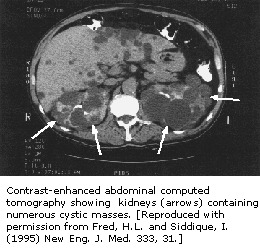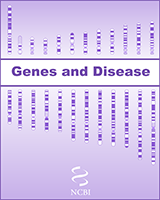NCBI Bookshelf. A service of the National Library of Medicine, National Institutes of Health.
National Center for Biotechnology Information (US). Genes and Disease [Internet]. Bethesda (MD): National Center for Biotechnology Information (US); 1998-.

Adult polycystic kidney disease (APKD) is characterized by large cysts in one or both kidneys and a gradual loss of normal kidney tissue which can lead to chronic renal failure. The role of the kidneys in the body is to filter the blood, excreting the end-products of metabolism in the form of urine and regulating the concentrations of hydrogen, sodium, potassium, phosphate and other ions in the extracellular fluid.
In 1994 the European Polycystic Kidney Disease Consortium isolated a gene from chromosome 16 that was disrupted in a family with APCD. The protein encoded by the PKD1 gene is an integral membrane protein involved in cell-cell interactions and cell-matrix interactions. The role of PKD1 in the normal cell may be linked to microtubule-mediated functions, such as the placement of Na(+), K(+)-ATPase ion pumps in the membrane. Programmed cell death, or apoptosis, may also be invoked in APKD. Further clarification of the pathogenesis of the disease await further research.
The so-called 'cpk mouse' is a well known model for the human disease. Studying the molecular basis of the disease in the mouse is expected to provide a better understanding of the human disease, and is hoped to lead to more effective therapies.
Related diseases
- Genome view see gene locations
- Entrez Gene collection of gene-related information
- BLink related sequences in different organisms
- Research articles online full text
- Books online books section
- OMIM catalog of human genes and disorders
- GeneReviews a medical genetics resource
- Fact sheet from the National Institute of Diabetes and Digestive and Kidney Diseases, NIH
- Polycystic kidney disease - Genes and DiseasePolycystic kidney disease - Genes and Disease
Your browsing activity is empty.
Activity recording is turned off.
See more...
